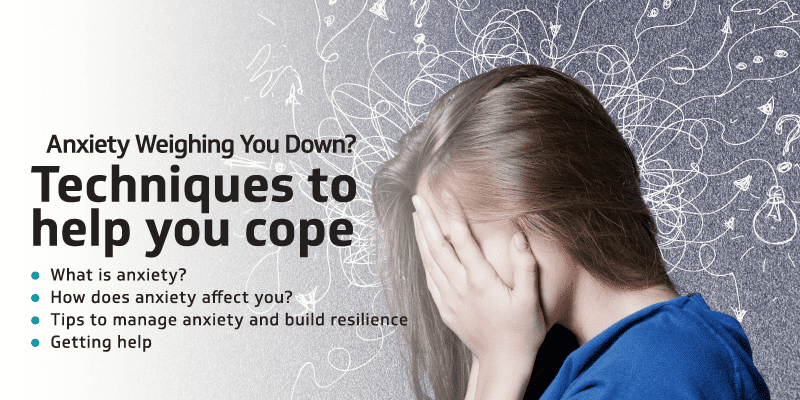
Kiran starts every morning with aches and pains, grumbling about the chores she must do that day. Today was different: she woke up energetic and excited to catch an early-morning flight for a vacation with friends. All her troubles had vanished overnight.
Has this happened to you?
PERCEPTION vs. REALITY
Imagine this: your boss calls you to present a new proposal to stakeholders. Do you find it difficult and stressful, or do you jump at the opportunity to showcase your talents and get visibility? These are two very different reactions to the same event, based on your thoughts and perceptions of it.
How we respond to a situation depends on the lens through which we view it. Our thoughts play the role of a conductor for our feelings and behaviour.
We all experience stressors, burdens and pressures as we go through life, but sometimes they are overwhelming and we doubt we can cope. We may feel we’ve reached our limit and can’t handle any more. We may be irritable, tense or out of control, interfering with our ability to function at work or at home. If these responses persist, they can negatively impact our relationships and health.
WHAT THE SCIENCE SAYS
The American Psychological Association (APA) defines anxiety as ‘an emotion that is characterised by feelings of tension, worried thoughts, and physical changes.’
Anxiety is an overreaction about the outcome of an event. Its premise is either in the past or the future; we relive a past hurt or imagine how a past event has impacted us, or we predict and worry about the outcome of something that hasn’t yet happened. The roots of anxiety lie in self-protection in the face of a perceived threat. When we’re anxious, our response to the threat is disproportionate or irrational – put simply, a problem may seem bigger than it really is.
MANAGING YOUR ANXIETY
Here are some techniques that can help reduce your anxiety and cope more effectively with the burdens of life:
1. Acknowledge your feelings
Observe, recognise and accept your feelings. Seen objectively, your problems may be less serious than you think, but your feelings are genuine nonetheless. Resisting them may make you feel worse, until you feel anxious about your anxiety. You will feel discomfort, and that’s okay. Don’t put conditions on yourself; rigid rules of ‘must’ and ‘should’ just aggravate your stress. It’s acceptable to feel worried, nervous, scared, angry or sad. Embrace all your faces.
2. Redirect your focus
Anxiety happens when we worry about the future or wallow in the past. Bring your focus back to the here and now with breathing exercises that relax you. Be mindful, go for walks, listen to music, meditate, read a book, take a relaxing bath or do something else that you enjoy.
3. Keep a Journal
Writing down your thoughts and feelings is a great way to sort them out. Whatever situation you’re in, writing about your reaction to it will help you recognise triggers and patterns that cause your anxiety and how it affects you.
4. Challenge yourself
Identify the unhelpful thoughts that make you uneasy, and challenge yourself by checking whether there is any evidence to support them. Ask yourself whether these thoughts are rational. Examine them from every angle: how likely is the outcome you foresee? How true is your belief about a past event? Imagine what you would say to a friend having such thoughts. Try reframing them in a positive, optimistic way. Try to be more flexible.
5. Change your perspective
You’re feeling stressed now, but is this stressor going to be important in the long run? Will it matter in a few years? Are these circumstances permanent? Gain faith in yourself by looking back at how you survived other stressful situations in your life. Practicing gratitude can also help you focus on the positive aspects of you situation.
6. Organise your worry time
Nagging worries can hijack your day and distract you from getting things done. Set aside time for worrying, and drag your attention back to the present for now. At your scheduled worry time, focus on solutions, write a plan and schedule the actions you need to take. It may sound strange, but it works!
7. Ask for help
Sometimes, your anxiety symptoms – like irritability, disturbed sleep, constant physical or mental strain, being on edge, poor concentration or fatigue – may be too much to handle on your own. A qualified mental health professional can listen to you without judgement and help you craft a plan to manage your anxiety better.
Problems, worries, fears and self-doubts are part of life, and we all have our own personalised bag of burdens. We can bear our burdens lightly by changing how we carry them, examine them with awareness and acceptance, build and believe in our strength to cope, and move forward with a spring in our step.
“When I look back on all these worries, I remember the story of the old man who said on his deathbed that he had had a lot of trouble in his life, most of which had never happened.”
– Winston Churchill
The Second World War, Vol II: Their Finest Hour (1949)

Ruchika Sethi
Counselling Psychologist
Ruchika holds Master’s degrees in Psychology and Commerce, bachelor’s degrees in Commerce and Education, and a diploma in Psycho-Competency Tools and Techniques (affiliated to ICPEM). She is a certified counsellor from Parivarthan Counselling Training and Research Centre, Bengaluru. She has completed several professional certifications in the areas of Positive Psychiatry & Mental Health (University of Sydney, Coursera), Emotional Intelligence, Life Skills Training, Transactional Analysis, and Yoga Instruction. She has attended workshops on Self-care Drama Therapy, Indian Psychology for Health and Wellbeing from NIMHANS.
Ruchika is available for consultation at HealtheMinds.com.
